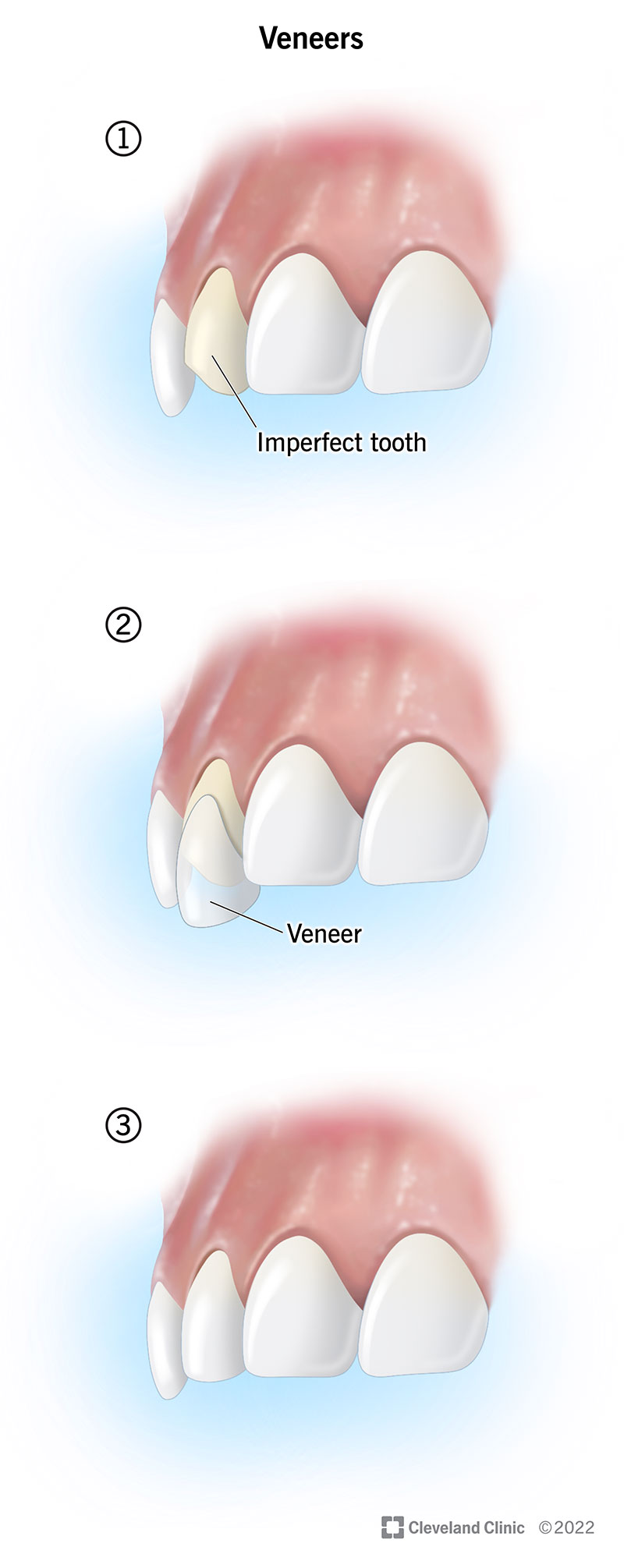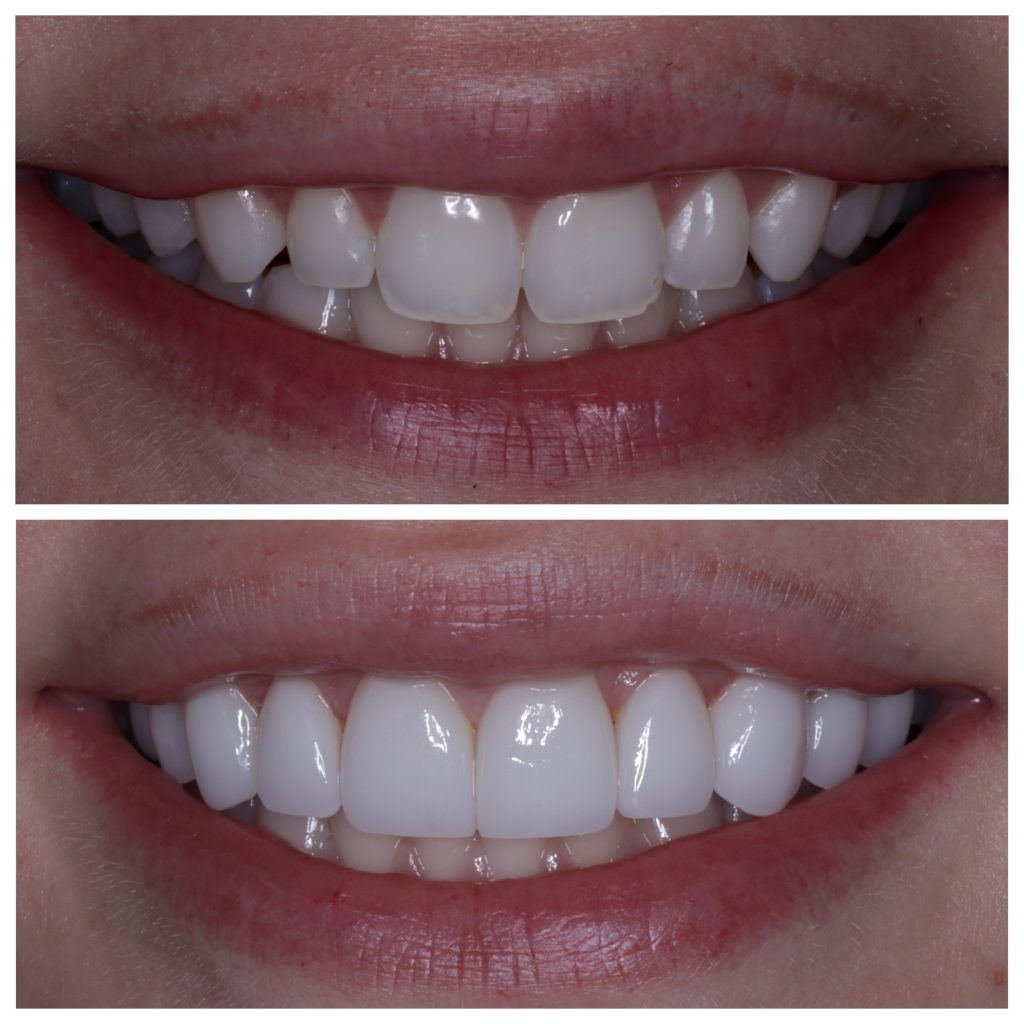Veneers Teeth vs. Dental Veneers: What You Should Know Before Choosing
Opening the Keys of Veneers: Truths, Kinds, and Advantages for an Attractive Smile
Veneers use an engaging service for those looking for to boost their smiles. These oral improvements can deal with different flaws, from discoloration to misalignment. With options like porcelain and composite, individuals can choose based upon their demands and preferences. However, recognizing the nuances of veneers, including application and care, is essential. What variables should one consider before choosing? The responses may stun those thinking about this visual oral alternative.

Recognizing Veneers: What Are They?
Veneers are slim, tailor-made shells made to cover the front surface of teeth, improving their look. Usually crafted from resilient materials, these shells are customized to fit each individual's teeth exactly. They serve several objectives, including dealing with aesthetic flaws such as staining, chips, or gaps. The application procedure involves a dental practitioner preparing the teeth, typically by eliminating a small amount of enamel to ensure a snug fit. As soon as prepared, the veneers are bonded to the teeth making use of a strong adhesive.
Individuals typically select veneers for their capacity to create a natural-looking smile while offering a long-lasting option to oral blemishes. Unlike various other cosmetic dental care alternatives, veneers call for minimal invasive treatments, making them a popular choice. The result is a better smile that can substantially increase an individual's self-confidence and self-confidence. Generally, veneers supply a reliable strategy to attaining a much more unified and appealing dental look.
Kinds of Veneers: Porcelain vs. Compound
When considering aesthetic oral options, two main kinds of veneers stand out: porcelain and composite. Porcelain veneers are crafted from a resilient ceramic material that simulates the natural look of teeth. They are understood for their discolor resistance and ability to reflect light in a similar way to natural enamel, providing an aesthetic allure that lots of patients need. The application procedure usually entails even more preparation of the tooth structure and might need several visits to the dental practitioner.
On the various other hand, composite veneers are made from a tooth-colored material that is directly put on the teeth. This type enables quicker application and can often be finished in a single visit. While they are cheaper than porcelain veneers, they might not provide the very same longevity or resistance to discoloration. Eventually, the option in between porcelain and composite veneers relies on specific preferences, budget, and specific oral needs.
The Advantages of Picking Veneers
Choosing veneers offers many benefits that can considerably enhance both the aesthetics and capability of an individual's smile. One of the main advantages is their ability to deal with blemishes such as discoloration, spaces, and misalignment, causing a more consistent look. Veneers can likewise improve the resilience of teeth, giving a safety layer that shields them from damage.
They call for minimal tooth prep work compared to various other dental procedures, protecting even more of the natural tooth structure. This conservation adds to a much healthier dental atmosphere while still attaining a magnificent smile.
Veneers are extremely personalized, allowing individuals to select the shape, dimension, and color that finest matches their choices. In addition, they are stain-resistant, making it less complicated to preserve a intense and attractive smile with time. Overall, veneers present an efficient option for those seeking both cosmetic improvement and long-lasting dental wellness advantages.
The Veneer Application Process
The veneer application process entails several key steps to ensure suitable results. An examination is conducted to assess the patient's demands, complied with by the preparation and shaping of the teeth. The veneers are adhered in area, with changes made for a best fit and appearance.
Initial Examination Tips
An extensive initial examination is crucial for any person considering veneers, as it sets the structure for an effective therapy. Throughout this conference, the dental professional examines the individual's dental health, talking about any existing concerns that could affect the veneer application. This evaluation might include X-rays and an aesthetic assessment to determine the problem of the teeth and periodontals.
The dental professional likewise involves the client in a thorough discussion regarding their visual objectives, preferences, and assumptions. They might offer various veneer options tailored to the client's details demands. Furthermore, the professional describes the treatment, possible threats, and aftercare needs, ensuring that the client is well-informed and comfy before waging the treatment.
Prep Work and Shaping Teeth
After the preliminary assessment, the next phase involves the preparation and shaping of the teeth to suit the veneers. This important step is executed by the dental expert, that carefully analyzes the tooth framework to establish the quantity of enamel that needs to be gotten rid of. Usually, a slim layer, generally around 0.5 millimeters, is slashed off to guarantee a proper fit for the veneers. Accuracy is paramount during this procedure, as it affects both the overall comfort and the aesthetic result. When the teeth are sufficiently formed, impressions are required to produce custom-made veneers that line up perfectly with the client's oral profile. This meticulous prep work establishes the phase for a successful veneer application, enhancing both look and feature.
Bonding and Final Adjustments
Adhering to the shaping and prep work of the teeth, the bonding procedure starts, marking an essential stage in the veneer application. Throughout this stage, a dental adhesive is applied to the prepared tooth surface, ensuring a strong bond between the tooth and the veneer. The dental practitioner meticulously places the veneer, making adjustments to attain the wanted alignment and looks. As soon as correctly positioned, a special light is utilized to treat the sticky, solidifying the bond. After healing, the dental practitioner conducts final changes, cutting any type of excess material and refining the veneer's form to assure an all-natural look. This careful focus to detail enhances both function and visual appeals, adding to a total lovely smile that is sturdy and durable.
Taking care of Your Veneers: Maintenance Tips
Caring for veneers is necessary to maintain their appearance and longevity. A regular everyday cleansing routine, conscious avoidance of discoloring foods, and regular dental exams more are key parts of effective upkeep. These methods help guarantee that veneers remain in peak condition and continue to boost one's smile.
Daily Cleaning Regimen
Routinely maintaining veneers is vital for their durability and appearance. A correct day-to-day cleaning routine can assist preserve their shine and stop damage. Dental practitioners recommend brushing two times a day with a soft-bristled tooth brush and fluoride tooth paste, making sure that all surfaces are cleansed delicately to stay clear of scraping the veneer surface area. Flossing daily is likewise crucial to remove food bits and plaque from in between teeth, where brushes may not reach. Furthermore, utilizing an antimicrobial mouthwash can assist maintain dental health without damaging the veneers. It is suggested to avoid unpleasant cleaners and devices that can scrape the veneer. By following these straightforward steps, people can maintain their veneers looking attractive while advertising general oral wellness.
Preventing Discoloration Foods
Although veneers are designed to improve the appearance of teeth, their susceptibility to discoloring requires careful dietary options. It is necessary for people with veneers to be mindful of certain foods and drinks that can cause discoloration. Dark-colored items such as coffee, red a glass of wine, and berry juices should be eaten in small amounts, as they are understood to discolor both natural teeth and veneers. Furthermore, acidic foods like citrus fruits container weaken the bonding agents used in veneers, making them much more susceptible to discoloration. To maintain an intense smile, it is recommended to rinse the mouth with water after eating discoloration foods and to practice normal oral hygiene. These thoughtful options contribute substantially to the longevity and aesthetic appeals of veneers.

Routine Oral Examinations

Preserving the honesty of veneers needs a dedication to routine oral examinations, as these appointments play an essential duty in ensuring their durability and appearance. During these gos to, dental experts can evaluate the problem of the veneers, looking for any type of signs of wear, damages, or underlying dental concerns. Furthermore, routine cleanings assist eliminate plaque and tartar that can build up around the veneers, promoting overall dental wellness. Dentists can additionally give personalized guidance on care strategies and items matched for veneer upkeep. By adhering to a timetable of exams, people can deal with prospective problems early, ensuring their smile stays stunning and lively. Eventually, regular oral sees are a crucial component of veneer treatment.
Is Veneers the Right Option for You?
Determining whether veneers are the right choice typically pivots on specific oral requirements and aesthetic objectives. For those looking for to attend to issues such as discoloration, chips, or imbalance, veneers can supply a transformative option. Prospects typically include individuals with healthy teeth yet prefer an enhanced smile.
Nevertheless, it is essential to take into consideration elements such as tooth enamel problem, the level of oral problems, and the desire to preserve veneers - Dental Veneers. Consulting with a dental expert is vital, as they can examine oral health and wellness and establish if veneers are appropriate
Additionally, potential candidates need to assess the lasting commitment, as veneers might require replacement every 10-15 years. Cost considerations also play a considerable role, as veneers can be a considerable investment. Eventually, the choice should be well-informed, balancing visual wishes with functional factors to consider for enduring outcomes.
Regularly Asked Concerns
The Length Of Time Do Veneers Typically Last Before Needing Replacement?
Veneers generally last between 10 to 15 years before requiring replacement. Factors such as oral hygiene, way of living options, and material quality can affect their durability, making routine dental check-ups essential for preserving their condition.
Are Veneers Safe for Individuals With Delicate Teeth?
Veneers can be risk-free for individuals with sensitive teeth, yet it typically depends on the more seriousness of sensitivity and the dental professional's strategy. Consulting an oral specialist before proceeding is vital to assure excellent end results.
Can Veneers Be Eliminated or Changed Quickly?

Do Veneers Spot Over Time, and Exactly How Can I Stop It?
Veneers can discolor gradually, especially from foods and beverages like coffee or merlot. To stop staining, maintaining excellent dental hygiene, using a straw for drinks, and routine oral cleanings are advised methods.
What Is the Expense Variety for Obtaining Veneers?
The cost of veneers normally ranges from $500 to $2,500 per tooth, depending on variables such as material type, dental professional experience, and location. Patients must talk to oral professionals for personalized quotes and funding alternatives.
As soon as the teeth are adequately formed, perceptions are taken to develop customized veneers that align flawlessly with the individual's dental account. Throughout this stage, a dental adhesive is used to the ready tooth surface area, guaranteeing a solid bond between the tooth and the veneer. It is essential to take right into account elements such as tooth enamel problem, the degree of dental concerns, and the readiness to preserve veneers. Veneers can be safe for people with sensitive teeth, yet it usually depends on the seriousness of level of sensitivity and the dental professional's technique. The cost of veneers normally varies from $500 to $2,500 per tooth, depending on variables such as product type, dental expert experience, and location.